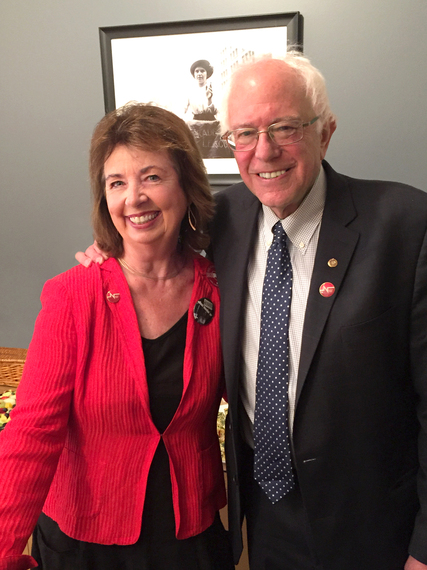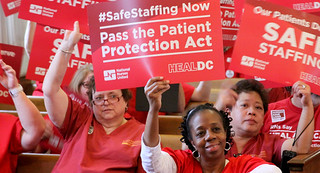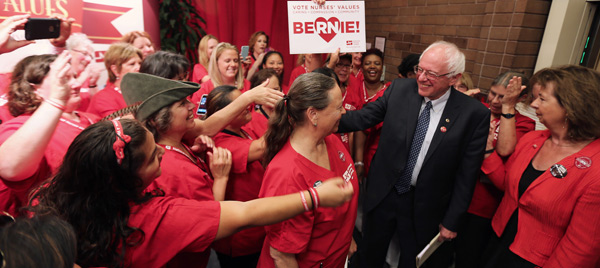As the weekend drew to a close, and California’s devastating wild fires continued to destroy homes and leave hundreds of evacuees displaced, National Nurses United’s Registered Nurse Response Network (RNRN) mobilized teams of volunteer nurses to help provide care for Butte and Valley fire evacuees.
“I live in Manteca, so these fires impacting areas like Jackson and Burson are only about 40 minutes from my house; I felt really compelled to help my own people,” says volunteer Amy Glass, RN, of Kaiser Modesto—a hospital which counts its own RNs among the Butte fire evacuees. “It’s just so upsetting to see people having to live outside; they’re out here because they have nowhere else to go.”
The Valley Fire began over the weekend, around 115 miles west of Sacramento—so far engulfing 67,000 acres. According to fire officials, the blaze has destroyed 585 homes, resulted in one confirmed death, and displaced around 13,000 people. The Butte Fire has blazed over more than 71,600 acres, destroying 166 homes and displacing around 10,000 people. To date, 2,362 fire workers have the Valley fire 15 percent contained, and 4,668 firefighters have the Butte fire 37 percent contained.
 Glass was joined in her relief efforts by fellow RNRN volunteers, who scouted sites where nurses could be of most assistance. By Monday night, the Butte fire team settled on making rounds through the Burson Full Gospel Church, New Hogan Lake Park, and Lake Camanche—all gathering places for evacuees. Around 150 evacuees have so far settled into free camping on Lake Camanche’s south shore—and RNRN volunteers have been caring for everything from a child’s cut toe, to a man with burns from repairing an overheated vehicle, trying to get his family to safety.
Glass was joined in her relief efforts by fellow RNRN volunteers, who scouted sites where nurses could be of most assistance. By Monday night, the Butte fire team settled on making rounds through the Burson Full Gospel Church, New Hogan Lake Park, and Lake Camanche—all gathering places for evacuees. Around 150 evacuees have so far settled into free camping on Lake Camanche’s south shore—and RNRN volunteers have been caring for everything from a child’s cut toe, to a man with burns from repairing an overheated vehicle, trying to get his family to safety.
“When we showed up at the Camanche campground and said, ‘We’re nurses; how can we help?’—they directed us immediately to a baby who had an ear ache,” says Katy Roemer, RN, of Kaiser Oakland’s Mother/Baby unit. “Babies don’t have fully developed immune systems yet, and it’s really concerning because here you are, living out in the open.”
Roemer—who also volunteered with RNRN during Hurricane Sandy—said she learned from her previous disaster-based nursing experience that it can be especially important for nurses to act as logistics coordinators, helping patients figure out how to access any additional required care, during a time when everything around them is crumbling. In this case, RNRN nurses served as a conduit between the baby’s mother and a doctor who was volunteering in the area, in the event a full-blown ear infection would require a prescription for antibiotics.
RNRN volunteers say they were touched by the way in which the tightly knit, mountain communities pulled together, with donations of clothing and food, and signs saying, “Stay positive!” and “We love our firefighters.” But the one thing neighbors can’t provide for each other is medical care, and with the nearest hospital an hour away and some residents struggling even pre-fire to access insurance or to cover a co-pay, nurses emphasize that people need to have a single payer healthcare system that covers everyone, at bare minimum—or healthcare post-disaster becomes even more of a challenge.

“I’m struck by how much not having an investment in public health is evident in disasters,” says Roemer, who explained they came across a local public health nurse “doing a heroic job” working 12 hour shifts to help members of the community, when she and her family hadn’t fully finished evacuating. “When you have a disaster, you have to have systems in place and then be able to implement them very quickly. Our emergency systems on a daily basis are stretched to the limit, and when we have a disaster, we can’t cope.”
“How do we deal with this now and in the future?” Roemer muses. “We need to invest in systems that are capable of responding—and we have to stop climate change. We have a state that is in a very dire situation; I looked at a map the other day, and there were so many fires, I couldn’t even count them; it got depressing. If you want to get to the root of all of it, you’ve got to address the climate crisis and invest in systems to stop climate change.”
Glass agrees, saying, “We really need people to start doing their part to address climate change now, or we’re going to be seeing more and more of these disasters.”
For their part, RNRN nurses will continue making the rounds of the Butte fire sites—and an additional team, including retired nurse practitioner Ann Mackenzie and Kaiser Oakland RN Erik Hoagland, is being dispatched to Calistoga to provide support for the Valley fire on Tuesday. As long as it is safe for them to continue, registered nurses say they will be on site at the fire-impacted areas for the duration of the time evacuees need care.
“It’s an honor to be here. People have been so grateful, and I’m thankful I’ve had this opportunity,” says Glass, whose voice cracks with emotion, recounting personal stories she’s heard—the fellow nurse who still wasn’t sure whether land in his family for 150 years had survived the fire, the people who left behind horses, with a phone number hastily scrawled on their hooves, in the event they were able to escape.
As the fire-driven winds kick up and white caps form on the drought-low waters of Lake Camanche, Glass embodies the same determination and care she’s seen in those around her, emphasizing, “I’m coming back with more nurses.”
RNRN is a project of National Nurses United, the nation’s largest union and professional organization of RNs, Global Nurses United, (GNU) and the California Nurses Foundation, a 501(c)(3) nonprofit. This network of direct-care RNs coordinates sending volunteer nurses to disaster-stricken areas where and when they are needed. With more than 20,000 direct-care RN members, RNRN has cared for thousands of patients during deployments that include the 2004 South Asia tsunami, Hurricanes Katrina and Rita, the massive earthquake in Haiti in 2010 and Super Typhoon Haiyan/Yolanda among others.
If you would like to make a tax-deductible donation to support the general RNRN disaster relief fund, go to http://nationalnursesunited.org/rnrn-disaster-relief-fund
If you are a nurse who would like to volunteer for the RNRN Valley and Butte fire efforts or for future needs, please visit: http://www.pcrecruiter.net/pcrbin/regfirst.exe?uid=haiti%20import.nnu&title1=Volunteer








 “Today, nurses across the nation join up our movement to heal America with the phenomenon that has spontaneously erupted around Bernie Sanders,” DeMoro said. “I proudly announce that National Nurses United is endorsing Sen. Bernie Sanders—friend, human rights champion—for President of the United States.”
“Today, nurses across the nation join up our movement to heal America with the phenomenon that has spontaneously erupted around Bernie Sanders,” DeMoro said. “I proudly announce that National Nurses United is endorsing Sen. Bernie Sanders—friend, human rights champion—for President of the United States.” In an hour-long Q&A, Sanders fielded questions from RNs from across the country, fostering a meaningful exchange often punctuated by cheers. Callers asked about the VA system (Sanders supports efforts for VA nurses to organize and would fight back against underfunding/efforts to privatize), safe staffing (Sanders co-sponsors federal ratios bill S 864), access to healthcare (he supports Medicare for all) and other
In an hour-long Q&A, Sanders fielded questions from RNs from across the country, fostering a meaningful exchange often punctuated by cheers. Callers asked about the VA system (Sanders supports efforts for VA nurses to organize and would fight back against underfunding/efforts to privatize), safe staffing (Sanders co-sponsors federal ratios bill S 864), access to healthcare (he supports Medicare for all) and other